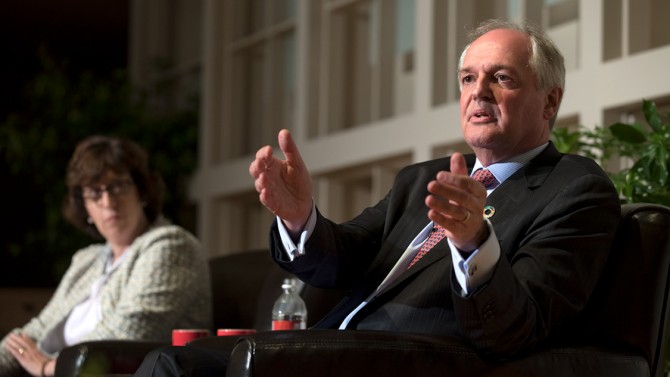Unilever CEO argues for sustainable capitalism
By Teagan Todd
Can capitalism be sustainable, in more than one sense of the word? For Unilever CEO Paul Polman, the answer is a resounding yes. Polman, the 35th Robert S. Hatfield Fellow in Economic Education, presented “The Case for Sustainable Capitalism” Oct. 12 to an audience of more than 200 people in Alice Statler Auditorium.
For Polman, questions of capitalism do not simply revolve around whether the economic system itself is “good” or “bad.” Instead, Polman asks how capitalism can evolve to suit society’s current desires and demands, including making business practices eco-friendly and socially responsible.
“[My] definition of sustainability is ... the future of your children and their children is more important to you than your personal greed,” Polman said when he argued that sustainability must also encompass human rights. He added that even if companies can’t be convinced to protect human rights on a moral basis, they can be convinced to protect them out of economic interest.
According to Polman, businesses that act as “positive contributors” to society will have longer life spans because they will be supported by the communities they benefit. He also explained that ignoring social and environmental concerns will cost companies more in the long run than addressing these concerns.
The Dutch-born businessman mentioned other issues related to sustainability, from food waste to carbon dependency. He commended Cornell’s efforts to create a more sustainable campus, citing Dining Services’ local sourcing of food as well as the university’s commitment to becoming carbon neutral by 2035. He also discussed society’s current lack of trust in business, government and the mass media.
Throughout the lecture, Polman emphasized his belief that people who have the luxury of having everything they need to survive on a daily basis have a duty to look out for, and subsequently aid, people around the world who do not. Mentioning global humanitarian concerns such as limited access to clean water and health care, Polman concluded the talk with a quote from the Dalai Lama, saying that the true purpose of enlightenment is to serve others.
The Hatfield fellowship is one of the highest honors Cornell gives to industry leaders to promote an exchange of ideas between academic and corporate communities. The fellowship and lecture are sponsored by Cornell’s Corporate and Foundation Relations.
Teagan Todd ’20 is a writer intern for the Cornell Chronicle.
Media Contact
Get Cornell news delivered right to your inbox.
Subscribe